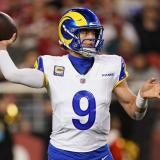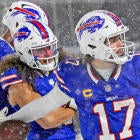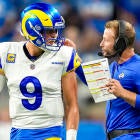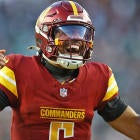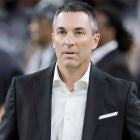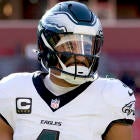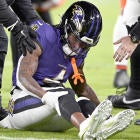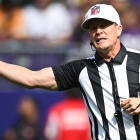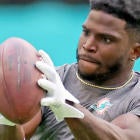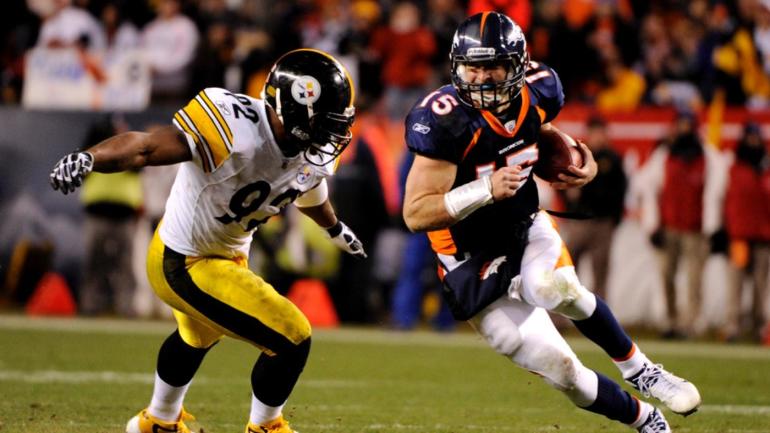
In what has been a crazy 2020 season so far, there is one thing that seems imminent with five weeks remaining in the regular season: a team with a non-winning record will host a playoff game. The current front-runner to earn that dubious distinction is the Giants, whose 4-7 record has them at first place in the NFC East. Washington, another 4-7 outfit, is right on their heels, while Philadelphia (3-7-1) and Dallas (3-8) are not too far behind.
While the winner of the East will surely be an underdog against whoever their first-round opponent will be, previous playoff teams with a losing record have had their share of success. In fact, half of the 12 teams that have made the playoffs with an 8-8 or worse record (excluding the expanded playoff field during the strike-shortened 1982 season) managed to win a playoff game before being ousted from the postseason.
Here's a look at the NFL's previous non-winning teams that managed to make the playoffs, a list that will surely welcome a 13th team come January.
1985 Browns (8-8)
A 5-11 team in 1984, the Browns won the AFC Central with an 8-8 record in 1985, Marty Schottenheimer's first season in Cleveland. Led by its two 1,000-yard running backs, Earnest Byner and Kevin Mack, Cleveland won three of its final five games to clinch a playoff berth. Facing the defending AFC champion Dolphins in first round round, the Browns actually jumped out to a 21-3 lead after two touchdown runs by Byner and a touchdown catch by Hall of Fame tight end Ozzie Newsome. Cleveland could not maintain their lead, however, as the Dan Marino-led Dolphins scored the game's final 21 points to prevail, 24-21. The '85 season was the beginning of a successful run for the Browns, who would appear in three AFC title games over the next four seasons.
No. 79: 1985 AFC Divisional Playoff - Dolphins vs. Browns “Marino 18-pt Comeback” (Jan. 4, 1986) #NFL100 @MiamiDolphins @DanMarino
— NFL (@NFL) September 28, 2019
📺: NFL 100 Greatest Games on @NFLNetwork pic.twitter.com/GlHy7oh4j3
1990 Saints (8-8)
Led by their talented linebacker trio of Sam Mills, Vaughan Jonson and Pat Swilling, the Saints finished second in the NFC West with an 8-8 record. And while their defense allowed just one Bears touchdown in the first round of the playoffs, the Saints' offense managed just two field goals in a 16-6 loss.
The loss to the Bears was the first of three consecutive playoff losses in as many seasons for the Saints, who would have to wait until the 2000 season before winning their first-ever playoff game. The Saints would close the decade by winning their their first Super Bowl title.
1991 Jets (8-8)
The '91 Jets represent the franchise's only team that qualified for the playoffs from 1987-97. Led by Pro Bowl quarterback Ken O'Brien (the often overlooked member of the fabled quarterback draft class of 1983) and receivers Rob Moore and Al Toon, the Jets made the playoffs despite losing three out of their last four games. But after losing a heartbreaking game to the Patriots in Week 16, the Jets managed to eke out an overtime win over the Dolphins in Week 17 to clinch a playoff spot. And while their defense played well enough to win, the three O'Brien picks doomed the Jets in their 17-10 playoff loss to Warren Moon and the Oilers.
1999 Cowboys (8-8)
Two years after winning their third Super Bowl in four years, the Cowboys fired Barry Switzer after Dallas stumbled to a 6-10 record in 1997, the franchise's worst mark since Jerry Jones purchased the team in 1989. And while new Cowboys coach Chan Gailey led the Cowboys back to the playoffs in 1998, the season ended with a humbling playoff loss to Jake Plummer and the Cardinals.
The '99 Cowboys suffered a huge blow when future Hall of Fame receiver Michael Irvin suffered a career-ending injury four games into the season. Adding insult to injury was the fact that Randy Moss, the receiver many thought Dallas would draft to succeed Irvin in the '98 draft, caught a 58-yard touchdown in Minnesota's 27-10 playoff win over Dallas. The Cowboys would not make the playoffs again until 2003, Bill Parcells' first season in Dallas. The Cowboys would go 14 years between playoff wins before Tony Romo, Jason Witten and company ended the drought in 2009.
1999 Lions (8-8)
The '99 Lions may be the most interesting non-winning playoff team. During training camp, Barry Sanders, a member of the NFL running back Mount Rushmore, shocked everyone after announcing his retirement just days before the start of training camp. Despite Sanders' absence, the Lions, who went 5-11 with Sanders the previous season, went 8-8 in the regular season. While the Lions did exceed expectations, it shouldn't necessarily be considered a success story, as Detroit lost its last five games (including a 27-13 playoff loss to Washington) after an 8-4 start.
Detroit's surprise playoff season was largely due to the play of defensive end Robert Porcher (15 sacks), receivers Germane Crowell (1,338 yards, seven touchdowns) and Johnnie Morton (1,129 yards, five touchdowns) and quarterback Charlie Batch, who went 6-4 as the Lions' starter.
2004 Vikings (8-8)
A perennial playoff team in the '90s, the Vikings made the playoffs just once from 2001-07. Minnesota's lone playoff season during that span was in 2004, when the 8-8 Vikings made the playoffs a year after being left out of the postseason despite posting a 9-7 record.
The '04 Vikings were the first non-winning playoff team to win a postseason game after defeating the Packers in Green Bay. That game is largely remembered for Randy Moss' controversial touchdown celebration near the end of the Vikings' 31-17 win. Moss would play his final game as a Viking (we're not including his cup of coffee with Minnesota in 2010) the following week in Minnesota's 27-14 loss to the eventual NFC champion Eagles.
Randy Moss Moon at Lambeau #nfl #packers #vikings pic.twitter.com/F8dWqZjHIe
— 1stDown (@1stDownNetwork) August 18, 2016
2004 Rams (8-8)
This was the true end of the "Greatest Show on Turf" era in St. Louis. Two years after their shocking upset loss to the Patriots in Super Bowl XXXVI, the Rams suffered another heartbreaking playoff loss in 2003 after Steve Smith ended St. Louis' season with a 69-yard touchdown in overtime.
St. Louis appeared to carry that loss into the '04 season, as the Rams lost eight of their first 14 games. The Rams, led by running backs Marshall Faulk and Steven Jackson and receivers Isaac Bruce and Torry Holt, were able to salvage their season after defeating the Eagles and Jets (in overtime) to close out the regular season. In the first round of the playoffs, two late scores propelled the Rams to an upset win over the Seahawks, who a year later would represent the NFC in the Super Bowl. The Rams were no match for Michael Vick and the Flacons in the divisional round, however, as the Falcons rushed for 327 yards in a 47-17 win. The Rams would not return to the playoffs until 2017, Sean McVay's first season as coach.
2006 Giants (8-8)
A year after going 11-5 under second-year quarterback Eli Manning, the Giants roared out to a 6-2 start to the 2006 season. New York, largely due to a defense that finished 28th in the NFL in passing and 32nd in red zone efficiency, went 2-6 during the second half of the season. The Giants' season mercifully ended with a 23-20 loss to Jeff Garcia and the Eagles in the wild-card round. The loss was the final game for Giants running back Tiki Barber, who hung up his cleats after rushing for 1,662 yards at the age of 31.
While the Giants lost Barber, they made several key changes with the offseason hiring of coordinators Kevin Gilbride and Steve Spagnuolo. Both coaches played a role in the Giants' 10-6 regular season in 2007 that concluded with an entertaining 38-35 loss to the 16-0 Patriots. The Giants, following an improbable playoff run, would upset New England in Super Bowl XLII, 17-14.
2008 Chargers (8-8)
From 2004-09, the Chargers posted five winning seasons while averaging over 11 wins per season. The one season that saw the Chargers fail to post a winning record during that span was in 2008, when the Chargers won their final four regular season games after a 4-8 start. Darren Sproles' 22-yard touchdown run in overtime gave the Chargers a win over the visiting Colts in the wild-card round. Despite Philip Rivers' 308 passing yards and three touchdowns, the Chargers were unable to keep pace with the eventual Super Bowl champion Steelers in the divisional round, as Pittsburgh ran for three scores while holding the Chargers to just 15 rushing yards in a 35-24 win.
The '08 season was the final one in San Diego for running back LaDainian Tomlinson, who finished his Hall of Fame career with the Jets.
2010 Seahawks (7-9)
The 2010 Seahawks can be summed up with one play: Beast Quake. With the 7-9 Seahawks holding a four-point lead late in their wild-card game against the defending champion Saints, Marshawn Lynch's jaw-dropping 67-yard run capped off Seattle's first playoff win during the Pete Carroll era. The game also served as the final playoff win for quarterback Matt Hasselbeck, who led Seattle to its first Super Bowl five years earlier.
While 7-9 was good enough to win the division in 2010, the same record resulted in a third place finish for the Seahawks in 2011. In 2012, a rookie quarterback named Russell Wilson led Seattle to the divisional round of the playoffs. In 2013, Carroll, Wilson, Lynch and Seattle's "Legion of Boom" defense hoisted the franchise's first Lombardi Trophy.
.@MoneyLynch breaking down BeastQuake?
— NFL (@NFL) December 28, 2019
MUST. SEE. TV. 📺👀 (via @NFLFilms) pic.twitter.com/XChiUumq2c
2011 Broncos (8-8)
When most fans think of the 2010s Broncos, Peyton Manning's record-setting 2013 season and the defensive-fueled 2015 championship run are the first two things that come to mind. But the 2010s Broncos are also owners of one of the most bazaar seasons in recent memory. After Kyle Orton managed to win just one of his five starts, Denver coach John Fox decided it was "Tebow Time," as he turned to second-year quarterback Tim Tebow to turn around Denver's season.
Tebow helped lead the Broncos to six straight wins that included several improbable come-from-behind efforts. One of those wins came against Rex Ryan's Jets in 2011, as Tebow's 20-yard touchdown run with one minute left gave Denver a 17-13 win. But after leading Denver to an 8-5 record, Tebow's subpar passing played a large role in the Broncos losing their final three regular season games. Denver was not expected to do much against the defending AFC champion Steelers in the wild-card round.
After forcing the Steelers to settle for two early field goals, two field goals of their own and two touchdowns by Tebow gave the Broncos a 20-6 halftime lead. But after Pittsburgh rallied back to force overtime, Tebow abruptly ended the game when he connected with Demaryius Thomas for an 80-yard touchdown. The win not only added to Tebow mania, it signaled the end of a particular era for the Steelers, who would endure consecutive 8-8 seasons before returning to the postseason in 2014. And while the Broncos' magical 2011 season came to an emphatic end a week later in New England, Broncos president John Elway, realizing his franchise was a quarterback away from contending for a title, convinced Peyton Manning to come to Denver during the offseason. It took four years, but Manning eventually helped Elway win his third ring.
Tim Tebow found Demaryius Thomas in overtime -- and just like that, the game was over.
— NFLonCBS (@NFLonCBS) April 18, 2020
Watch the @Broncos classic playoff win over the Steelers tonight at 10 PM ET on @CBSSportsNet. pic.twitter.com/baYGvrRyZH
2014 Panthers (7-8-1)
Like the '04 Rams, the Panthers struggled to shake off a disappointing playoff loss from the prior season. But after a 3-8-1 start, Carolina won its final four regular season games to join the 2010 Seahawks as the only teams in NFL history to win their division with a losing record. Carolina became the fifth non-winning playoff team to win in the postseason after ousting the Cardinals in the wild- card round, 27-16. The Panthers hung tough during the first three quarters in Seattle before allowing three unanswered fourth quarter touchdowns in their 31-17 loss in the divisional round.
Cam Newton, who dealt with injuries throughout the 2014 season, enjoyed a career year in 2015, earning league MVP honors while leading the Panthers to a 15-1 record and an appearance in Super Bowl 50.
Want inside access into this unprecedented NFL season? Download and subscribe to All Things Covered with Patrick Peterson and Bryant McFadden for a player's perspective.



